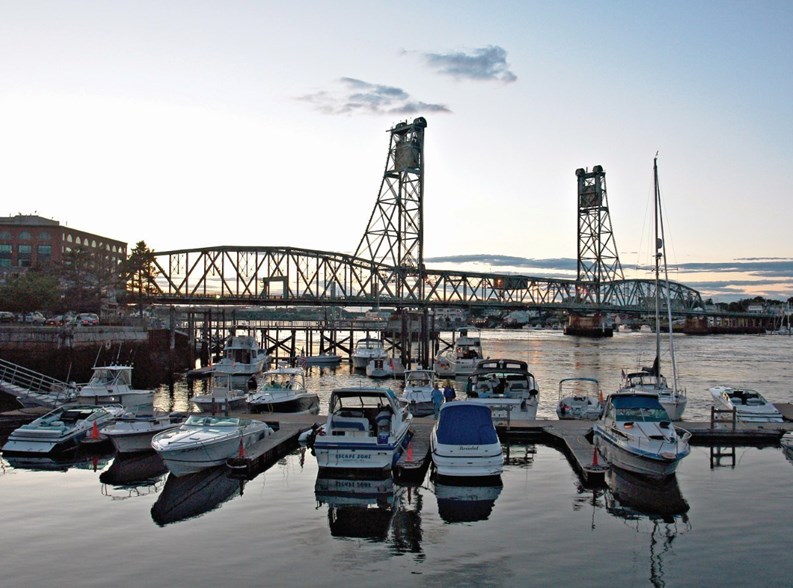Consensus holds that Portsmouth, New Hampshire, has it all. Not content with a distinguished naval history only, the city of about 20,000 has blossomed like the strawberries once did on the banks of the Piscataqua River. Now, while remaining conscious and protective of its historical assets, it provides a welcoming haven for a diversity of art and business. It has been aptly nicknamed “The City of the Open Door.”
Connecting to the Past
The English settlement which was to become Portsmouth began in 1623, and was known as Piscataqua, for the river along which it lay. The name soon changed to Strawbery Banke, though at its incorporation as a town in 1653, the name was changed again, to Portsmouth, after the town in England that its founder had served. Because of its location on the river and its proximity to the ocean, Portsmouth quickly became a major center for shipbuilding and mercantile trade across the Atlantic.
In fact, Portsmouth was a pivotal place for much historical action. Although less celebrated in Revolutionary legend, Portsmouth (the capital of the New Hampshire colony until trouble with the British increased) received a warning visit from Paul Revere about a year before his famous “midnight ride” to Lexington and Concord. John Paul Jones, the famous Revolutionary War naval hero, boarded in town. In 1800, the Portsmouth Naval Shipyard became the first federal navy yard. Furthermore, two treaties were signed here, one in 1713 to end the fighting between the English and the Abenaki Indians, and the second in 1905, endingthe Russo-Japanese War.
Because most of Portsmouth’s income came from ships, the Embargo Act of 1807 made life difficult for those trying to make an honest living on the waterways, although some privateers struck it rich. The Industrial Revolutionand the advent of the railroad only added to the difficulties. A little deprivation, however, prevented the demolition and updating of many historic buildings. Now Portsmouth, which upgraded from a town to a city in 1849, is a thriving center once again, but with preserved reminders of its past glory.
Connecting to the World
The city of Portsmouth serves as the metropolitan center for that segment of the New Hampshire/Maine border known as “the Seacoast.” As such, it provides employment and income for the area. According to the Greater Portsmouth Chamber of Commerce, a person relocating to Portsmouth generally does so in order to work there. Although the city is only 50 miles each from Boston, Massachusetts; Manchester, New Hampshire; and Portland, Maine, relatively few people commute from Portsmouth to work in those cities. There would appear to be little need to commute anywhere else for work when you already have a foot in the “Open Door.”
On the other hand, reachability is certainly one of Portsmouth’s many assets. Not only is it geographically near three other New England cities, but it is accessible from major highways, including Interstate 95. The railway, which hindered the city’s growth at one time, provides an alternate route both in and out. Additionally, as New Hampshire’s only deep-water port, Portsmouth has its own Foreign Trade Zone, with means and right of entry to the Atlantic.
One more factor in both Portsmouth’s self-sufficiency and its ready accessibility is the Tradeport. The Chamber of Commerce website states, “More than 17 percent of the city’s land area is contained within the bounds of Pease International Tradeport, the former site of Pease Air Force Base. The Tradeport is a world-class business park focused on creating a diverse mix of businesses and promoting economic developmentand employment in the region.”
A glance at the Tradeport’s own website confirms the import of the statement. From computer software manufacturers to maintenance plants, from global marketing firms to nonprofit organizations, businesses and business people have found a home at the Tradeport. Not only does it provide a place to work, but it provides yet another avenue into and out of thecity. Though no longer an Air Force base, the site retains its runways and a terminal. Now Skybus serves the city as a quick, easy and highly affordable route for travel.
Connecting with the Community
Even apart from the Tradeport, within the city and its surrounds there are a variety of places to live and things to do. Portsmouth resident Paulina Shadowens waxes enthusiastic. “Portsmouth,” she says, “is generally a delightful place… because it’s so contained and doesn’t feel crowded.” This is true even though, she admits, the downtown area could be described as “bustling” even in the middle of the week. She recounts summer evenings with cafes full to overflowing, people sitting outside under umbrellas enjoyingtheir food and drink, and buskers making music in the streets.
Along with a diversity of restaurants and cafes, Portsmouth has a strong artistic community, with an emphasis on community. The attractive new library boasts state-of-the-art technology and architecture. The city’s antique Music Hall still hosts performances, both for adults and for children, of everything from Joshua Bell to independent movies. Strawbery Banke, the living history museum which took its name from the town’s past, numbers among the ranks of museumsand historic homes in the area which people can visit and through which they can connect to the past.
Nearby Prescott Park is a beautiful retreat along the Piscataqua River, where one can stroll along the water or among the lush flowerbeds. It is also the locale of many community events, such as the concerts and free theater productions in summer, and “First Night” festivities in winter. Tom Cocchiaro, the chamber’s communications manager, says, “We have a lifestyle that is second to none. You can do anything here. There is something to suit everybody, within a small footprint and without the hassles of a big city.” National publications have confirmed this sentiment, among themMoney magazine, which, within the last ten years, has listed Portsmouth five times as one of their Top Ten places to live in the country.
Bolstering this rating is the fact that the economy in Portsmouth is doing relatively well compared to much of the rest of the United States. In general, the incomes are higher here, and unemployment figures are lower. Housing costs are generally high, but with low vacancies. According to the Bean Report, an online service of realtor Michael Bean, real estate sale prices are up a little. Although fewer condominiums and single-family homes were sold this January than last, and for less than the asking price, almost all of the units in the premier Tidewatch Condominium Development are sold out.
Condos from $300,000 to $1 Million
Portsmouth property assessor Rosann Maurice states that Tidewatch condominiums range in price between $300,000 and $1 million. She cites Spinnaker Point as the other main condominium community in Portsmouth, although she also says that Portsmouth boasts 18,065 residential condominiumsversus 4,008 single family homes.
Across the board, Portsmouth condominiums contain units which are more reminiscent of apartments and start at $100,000, to high-end, premier units downtown, which exceed the million-dollar mark. According to Maurice, hotel chains have been redeveloping some of the historic buildings within the city to create their own condominium complexes.
Portsmouth does boast at least one manufactured housing community, Hillcrest Estates. These pleasant mobile home units provide an affordable option for those who wish to live on the Seacoast without being overwhelmed by traditional housing costs. Hillcrest does background checks on its applicants before granting residencein the park, and maintains an association similar to that of a traditional condominium complex.
Evidence confirms, then, that Ports-mouthreally does cater to everyone. From entertainment to education to business to housing, options abound. The door is open and the welcome mat is out.







Leave a Comment